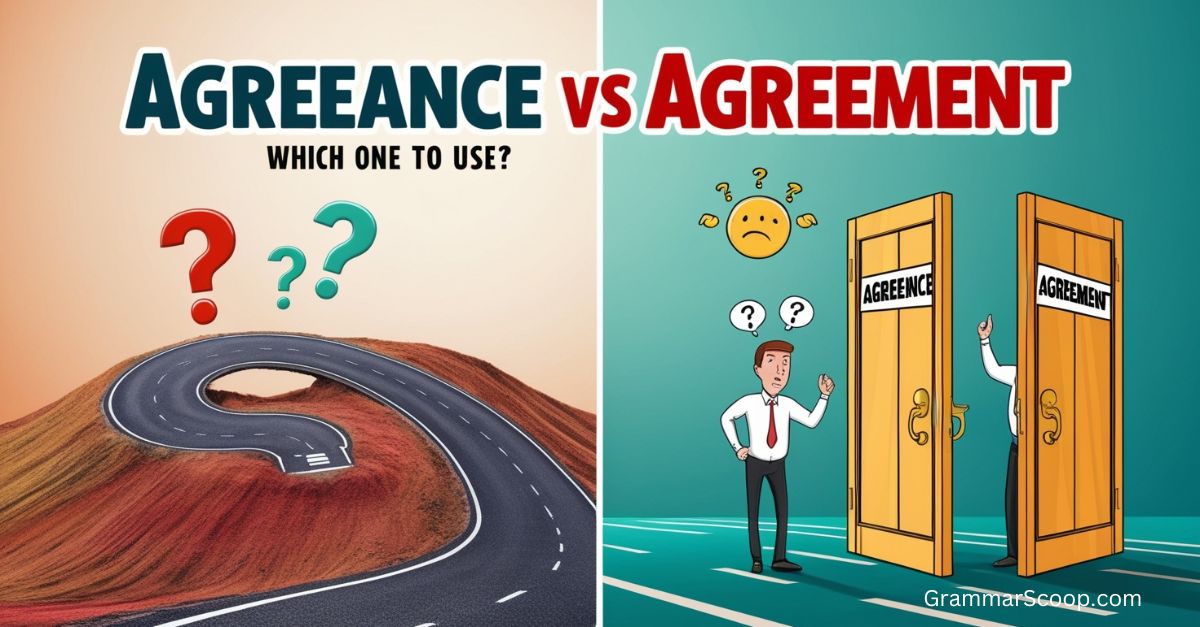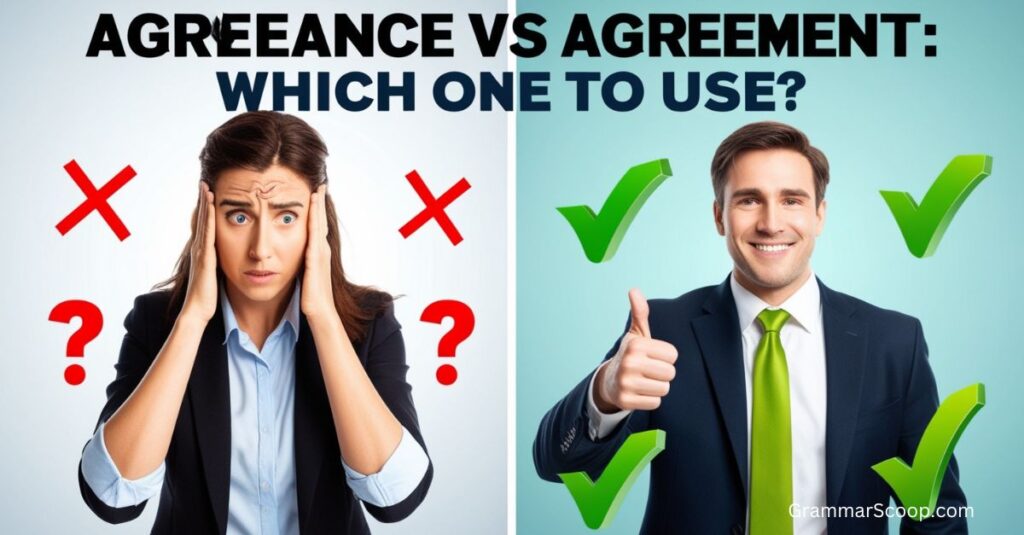Ever caught yourself wondering whether to use agreeance vs agreement in a sentence? You’re not alone. The confusion between these two words has sparked debates in business writing, legal documents, and even casual conversations. Let’s settle this once and for all with a deep dive into their meanings, history, usage, and when to use agreeance vs agreement—backed by real examples, expert advice, and grammar logic.
Quick Answer — Use “Agreement” in 99% of Cases
When Agreeance Might Show Up
- It pops up occasionally in informal speech or outdated texts.
- You might see it in regional dialects or from speakers mimicking archaic language.
- Some people mistakenly use it thinking it’s a more “sophisticated” synonym.
Why Agreement Is the Gold Standard
- Recognized by all major dictionaries.
- Accepted in professional communication, legal writing, and academic papers.
- Used in both formal and informal settings.
- Clear, concise, and understood worldwide.
Bottom Line: If you’re unsure, always go with agreement. It’s the universally accepted choice.
What Do They Mean?
Let’s break down each word and look at how they stack up.
agreeance meaning
Agreeance definition is technically a word, but it’s rare and largely considered archaic or nonstandard in modern English.
- Meaning: The state of agreeing or being in accord.
- Usage: Extremely limited; mostly informal or seen in niche contexts.
- Tone: May come across as pretentious or outdated.
“We are in agreeance on the new office policy.”
( Sounds clunky. Better: “We are in agreement…”)

Agreement Meaning
Agreement is the correct spelling and standard term across all types of writing.
- Meaning: Harmony in opinion, approval, or a formal pact.
- Usage: Common in legal documents, contracts, discussions, academic writing, and daily conversation.
- Tone: Versatile—works in formal vs informal situations.
“We reached an agreement after hours of negotiation.”

Table: Agreeance vs Agreement at a Glance
| Feature | Agreeance | Agreement |
|---|---|---|
| Dictionary Validated | Yes, but archaic | Yes, standard usage |
| Formal Use | Rarely used | Widely accepted |
| Informal Use | Sometimes (incorrectly) | Absolutely |
| Common in Business | No | Yes |
| Legal Documents | No | Required |
| Acceptability | Questionable | Preferred |
| Perceived Tone | Pretentious / Archaic | Clear / Professional |
Usage in Real-World Contexts
Let’s see how these two words behave in the wild.
In Business Communication
- “We came to an agreement after reviewing the budget.”
- “We came to an agreeance after reviewing the budget.” (Sounds off and incorrect.)
Legal Documents
- “This agreement is legally binding…” (standard legal language)
- You will never see agreeance used in a contract.
In Casual Speech
- You might hear: “We’re in agreeance on that.”
- Better to say: “We’re in agreement.”
Real-world tip: If you’re writing professional emails, reports, or proposals, always choose agreement.
Popularity and Acceptance
To make it crystal clear, let’s turn to actual data and expert opinions.
Dictionaries and Grammar Experts Say…
- Merriam-Webster: Agreement = standard. Agreeance = archaic.
- Oxford English Dictionary: Lists agreeance as obsolete.
- AP Stylebook & Chicago Manual of Style: Don’t mention agreeance at all. That says a lot.
Corpus & Internet Data
Google Ngram Viewer (2000–2024)
- Agreement outnumbers agreeance by a ratio of over 300:1.
- Usage of agreeance has remained flat or declined.
Google Search Comparison
| Term | Monthly Searches (US) | Result Count |
|---|---|---|
| agreement | 246,000+ | 3.1B+ |
| agreeance | 2,900 | 1.5M |
| agreeance vs agreement | 1,200 | 835K |
Clearly, agreement wins on all fronts: popularity, clarity, and correctness.
Explore further:
- High-Quality Or High Quality: Which One Is Correct?
- Plural of Journey: Is It Journeys or Journies?
- Liter or Litre: Spelling Differences and When to Use Each
- Hyperbole Vs Metaphor: Definition, Examples & Key Differences
- What’s the Past Tense of Panic?
Grammar, Tone, and Connotation Differences
Is Agreeance Redundant?
Yes. It’s a roundabout way of saying agreement, and doesn’t add nuance or clarity.
Does Agreement Cover More Ground?
Absolutely. It spans:
- Emotional alignment: “We are in agreement.”
- Legal contracts: “Sign the agreement here.”
- Informal chat: “Cool, we’re in agreement!”
Register and Audience
- Use agreement if you care about how you sound and who you’re speaking to.
- Use agreeance only if you’re quoting someone, writing creative fiction, or trying to make a stylistic point.
Etymology and History

Words evolve. Here’s how these two came to be.
Agreement
- Origin: Middle English, from Old French “agreer” meaning “to please.”
- First Use: 14th century.
- Current Use: Widely accepted in legal, academic, and casual language.
Agreeance
- Origin: Possibly 16th century, formed by analogy to appearance or acceptance.
- First Use: Appeared sporadically in Early Modern English.
- Current Use: Largely obsolete, but survives in rare informal usage.
Quote from linguist Bryan Garner:
“Agreeance is a needless variant that was never standard and should be avoided.”
Why the Confusion?
Influence from Similar Words
- Words like admittance vs admission, or appearance vs show, cause people to assume agreeance is valid.
- English is full of confusing pairs, so it’s understandable—but still incorrect.
Internet and Informal Speech
- Social media rewards speed over accuracy.
- Sloppy usage spreads quickly: “We’re in agreeance” becomes a meme, not a rule.
Lack of Education on Obsolete Words
- People aren’t taught which words have fallen out of favor.
- Tools like Grammarly or spellcheck won’t always catch agreeance as an error.
Agreeance vs Agreement: Sentence Examples
Here’s how to get it right every time.
Using “Agreeance” (Don’t Try This at Work)
- “We are in agreeance on the matter.” ( Sounds outdated)
- “The board reached full agreeance.” ( Not legally sound)
Using “Agreement” (Always Correct)
- “We reached a mutual agreement.”
- “The terms of the agreement were finalized today.”
- “There’s general agreement that the project will continue.”
Rewriting “Agreeance” Examples
| Poor Usage | Better Version |
|---|---|
| “We are in agreeance.” | “We are in agreement.” |
| “Full agreeance was reached.” | “Everyone came to an agreement.” |
| “Their agreeance surprised us.” | “Their agreement surprised us.” |
Synonyms and Alternatives
Sometimes you need variety. Here’s what you can say instead:
Synonyms for Agreement
- Accord
- Consensus
- Contract
- Pact
- Understanding
- Settlement
- Deal
Is There a Synonym for Agreeance?
Not really, because agreeance is not considered standard. Just use agreement or one of its synonyms.
In professional communication, clarity beats creativity. Say what you mean.
Final Verdict: Which One Should You Use?
- Choose agreement for clarity, correctness, and credibility.
- Avoid agreeance unless you’re being intentionally poetic or playful.
Remember: In grammar, just because a word exists doesn’t mean it belongs in your sentence.
FAQs
- What is the difference between agreeance and agreement?
Agreement is the accepted and standard noun form. Agreeance is considered archaic or nonstandard and is rarely used in modern English. - Is it “in agreement or in agreeance”?
Always say “in agreement.” The phrase “in agreeance” is incorrect in formal English. - Is agreeance obsolete?
Yes, by most modern standards. While still technically a word, it has fallen out of mainstream use. - What’s another word for agreeance?
There isn’t a proper one because agreeance itself isn’t standard. Instead, use agreement, accord, or consensus. - What is the meaning of “in agreement”?
It means two or more parties share the same opinion or have made a mutual decision. - What is a stronger word for agree?
Approve
Endorse
Concur
Final Thoughts
Language evolves, but that doesn’t mean we can ignore grammar differences and the importance of correct spelling. When it comes to agreeance vs agreement, the verdict is clear: agreement is the reliable, professional, and globally understood term.
Whether you’re drafting legal documents, sending a client email, or just chatting with coworkers, stick with agreement for solid, mistake-free communication.

Lisa Morris is a seasoned blogger and language enthusiast with a passion for making grammar simple and engaging. At Grammar Scoop, she shares clear, concise tips that help readers master the rules of English with confidence.






